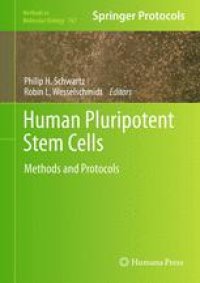
Ebook: Human Pluripotent Stem Cells: Methods and Protocols
Author: Robin L. Wesselschmidt Philip H. Schwartz (auth.) Philip H. Schwartz Robin L. Wesselschmidt (eds.)
- Tags: Cell Biology, Stem Cells, Cell Culture
- Series: Methods in Molecular Biology 767
- Year: 2011
- Publisher: Humana Press
- Edition: 1
- Language: English
- pdf
Almost daily, new technologies are being presented that move the field of human pluripotent stem cell research towards a future that may yield highly-effective, personalized medical treatments. Three enabling technologies at hand for human PSCs are 1) directed reprogramming of somatic cells, which eliminate many of the ethical issues associated with the derivation and use of human PSCs, increase genetic diversity of the available human PSC lines, and give rise to better in vitro human disease models; 2) the discovery that a Rho-associated protein Kinase (ROCK) inhibitor allows for efficient single cell passaging and cryopreservation, increasing the efficiency and reliability of hPSC culture; and 3) defined, animal-component-free media, which lay the groundwork for simplified scale-up for therapeutic applications, differentiation protocols, and toxicology screens. The aforementioned technologies can be found in Human Pluripotent Stem Cells: Methods and Protocols, a compilation of 33 detailed protocols in six categories of PSC research that cover laboratory essentials and the derivation of new PSC lines, including induced PSC lines, as well as their growth, maintenance, characterization, genetic manipulation, and differentiation. Written in the successful Methods in Molecular Biology™ series format, chapters include introductions to their respective topics, lists of the necessary materials and reagents, step-by-step, readily reproducible protocols, and notes on troubleshooting and avoiding known pitfalls.
Authoritative and accessible, Human Pluripotent Stem Cells: Methods and Protocols serves as an ideal guide to scientists conducting their own pluripotent cell research programs and makes great strides towards furthering human knowledge and, ultimately, improving the human condition.
Almost daily, new technologies are being presented that move the field of human pluripotent stem cell research towards a future that may yield highly-effective, personalized medical treatments. Three enabling technologies at hand for human PSCs are 1) directed reprogramming of somatic cells, which eliminate many of the ethical issues associated with the derivation and use of human PSCs, increase genetic diversity of the available human PSC lines, and give rise to better in vitro human disease models; 2) the discovery that a Rho-associated protein Kinase (ROCK) inhibitor allows for efficient single cell passaging and cryopreservation, increasing the efficiency and reliability of hPSC culture; and 3) defined, animal-component-free media, which lay the groundwork for simplified scale-up for therapeutic applications, differentiation protocols, and toxicology screens. The aforementioned technologies can be found in Human Pluripotent Stem Cells: Methods and Protocols, a compilation of 33 detailed protocols in six categories of PSC research that cover laboratory essentials and the derivation of new PSC lines, including induced PSC lines, as well as their growth, maintenance, characterization, genetic manipulation, and differentiation. Written in the successful Methods in Molecular Biology™ series format, chapters include introductions to their respective topics, lists of the necessary materials and reagents, step-by-step, readily reproducible protocols, and notes on troubleshooting and avoiding known pitfalls.
Authoritative and accessible, Human Pluripotent Stem Cells: Methods and Protocols serves as an ideal guide to scientists conducting their own pluripotent cell research programs and makes great strides towards furthering human knowledge and, ultimately, improving the human condition.
Almost daily, new technologies are being presented that move the field of human pluripotent stem cell research towards a future that may yield highly-effective, personalized medical treatments. Three enabling technologies at hand for human PSCs are 1) directed reprogramming of somatic cells, which eliminate many of the ethical issues associated with the derivation and use of human PSCs, increase genetic diversity of the available human PSC lines, and give rise to better in vitro human disease models; 2) the discovery that a Rho-associated protein Kinase (ROCK) inhibitor allows for efficient single cell passaging and cryopreservation, increasing the efficiency and reliability of hPSC culture; and 3) defined, animal-component-free media, which lay the groundwork for simplified scale-up for therapeutic applications, differentiation protocols, and toxicology screens. The aforementioned technologies can be found in Human Pluripotent Stem Cells: Methods and Protocols, a compilation of 33 detailed protocols in six categories of PSC research that cover laboratory essentials and the derivation of new PSC lines, including induced PSC lines, as well as their growth, maintenance, characterization, genetic manipulation, and differentiation. Written in the successful Methods in Molecular Biology™ series format, chapters include introductions to their respective topics, lists of the necessary materials and reagents, step-by-step, readily reproducible protocols, and notes on troubleshooting and avoiding known pitfalls.
Authoritative and accessible, Human Pluripotent Stem Cells: Methods and Protocols serves as an ideal guide to scientists conducting their own pluripotent cell research programs and makes great strides towards furthering human knowledge and, ultimately, improving the human condition.
Content:
Front Matter....Pages i-xix
Front Matter....Pages 1-1
Front Matter....Pages 3-13
Front Matter....Pages 15-27
Front Matter....Pages 29-29
Front Matter....Pages 31-35
Front Matter....Pages 37-54
Front Matter....Pages 55-65
Back Matter....Pages 67-85
....Pages 87-103